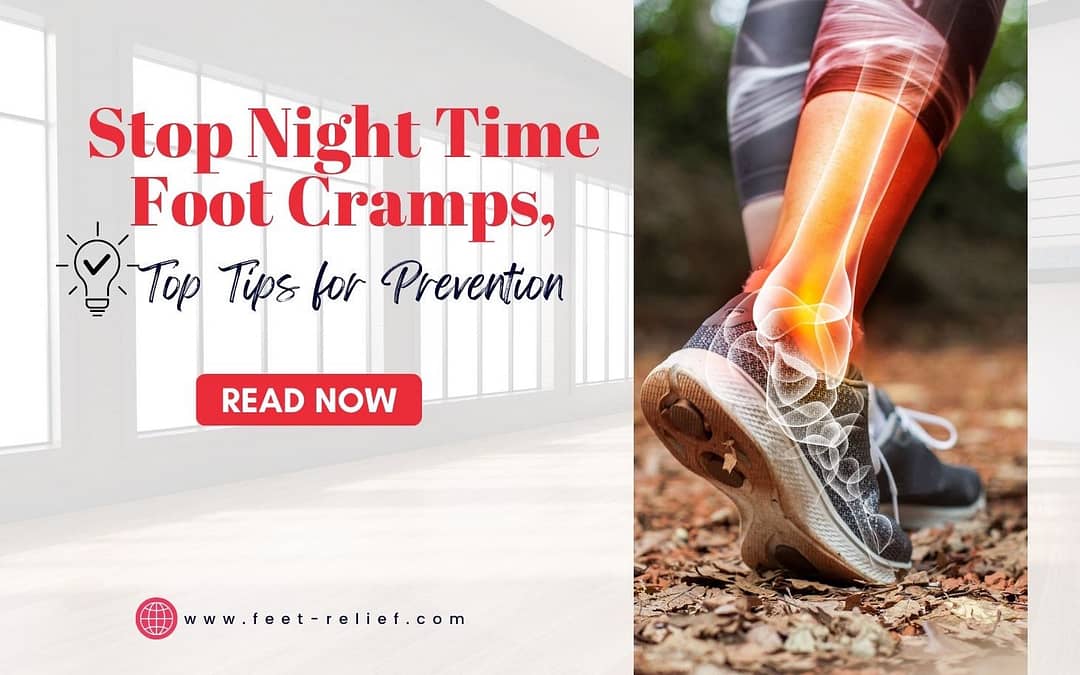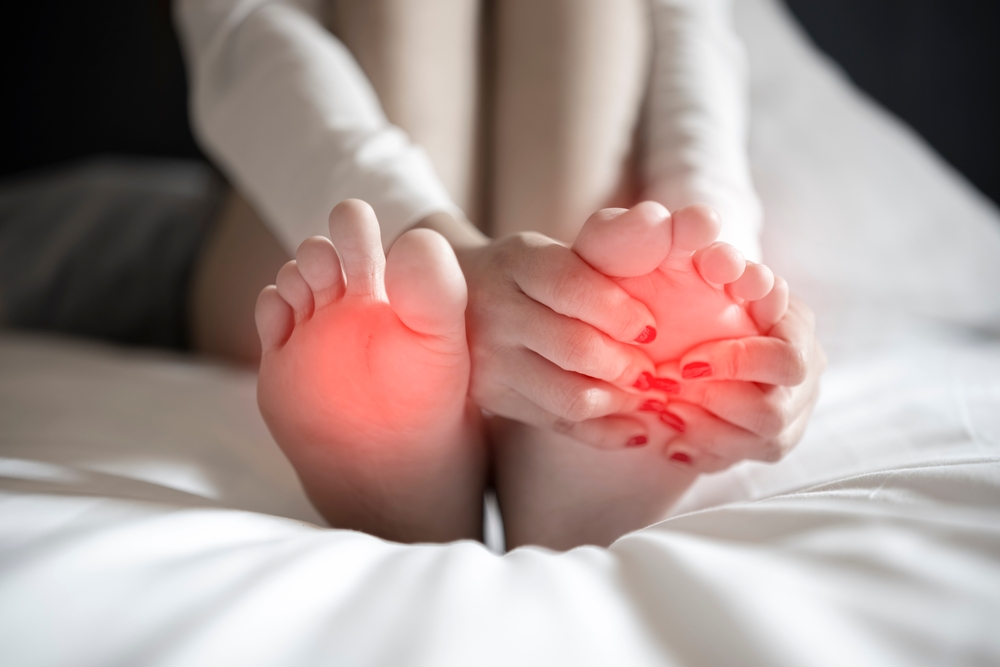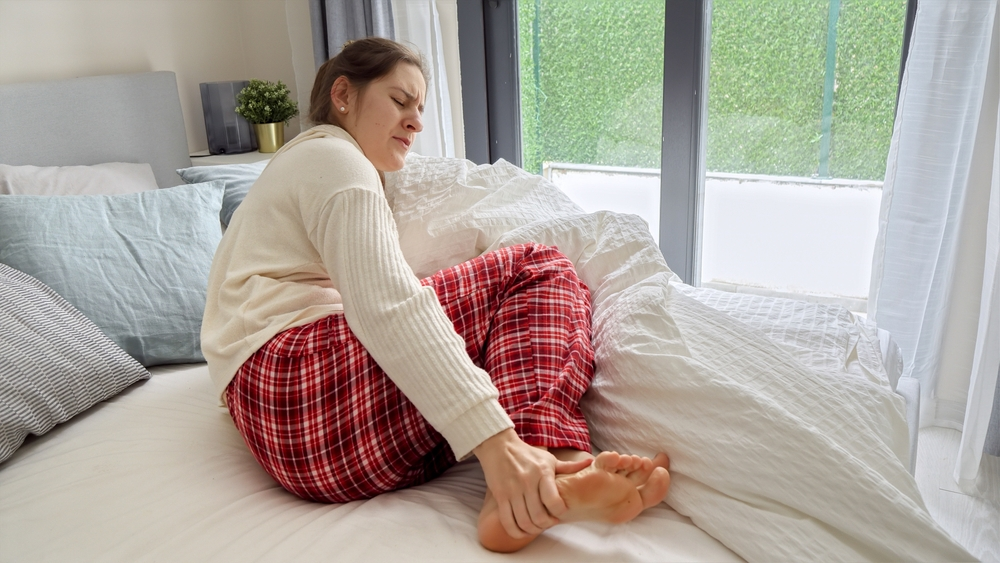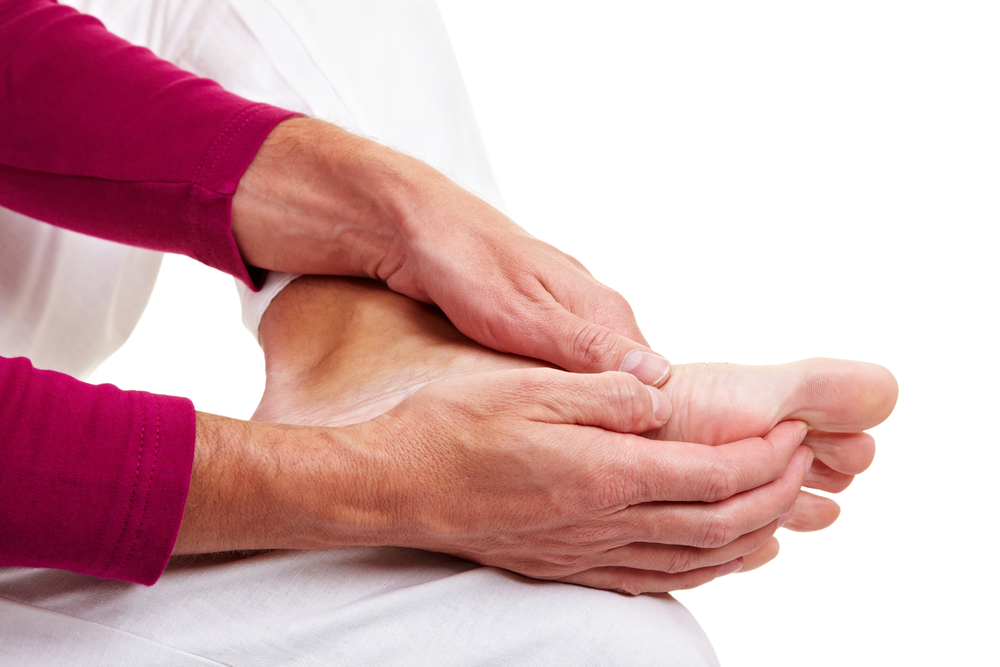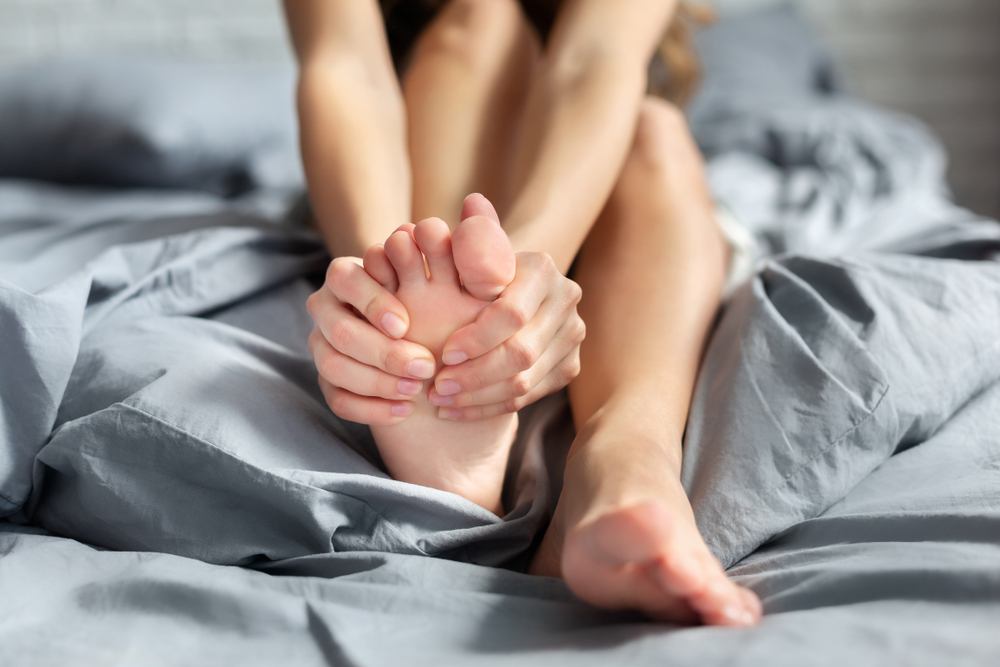Feet-Relief is supported by our audience. When you purchase through one of our links, we may earn a small affiliate commission. As an Amazon Associate I earn from qualifying purchases.Your cost is not affected.
Do you suffer from night time foot cramps that keep you up at night? If so, then you know how painful and disruptive it can be. Foot cramps can be caused by any number of underlying conditions. But fortunately with these steps you reduce or even eliminate daytime or nocturnal foot cramps. Night time foot cramps are painful! These involuntary muscle spasms keep us from going to sleep which then affects our health.
In this blog post, we discuss the various causes of foot cramps. We discuss this the muscle cramping issues. And we provide helpful tips on how to prevent them and relieve pain once they strike. With our guidance, your night-time disruptions due to foot cramping could become a thing of the past!
How to stop foot cramps
SAY GOODBYE TO NIGHTTIME FOOT CRAMPS: TIPS AND TRICKS TO PREVENT THEM
Stop Foot Cramps at night or anytime
Imagine waking up in the middle of the night with a sudden, sharp pain in your foot or leg. That’s what people who experience nighttime foot cramps go through. These cramps are involuntary muscle contractions that can occur while you’re sleeping or at rest. They can last for several seconds or even minutes, causing significant discomfort and sleep disruption.
Nighttime foot cramps can affect people of all ages and are quite common. They can be caused by various factors, such as dehydration, muscle fatigue, or an underlying medical condition. The good news is that there are ways to prevent and alleviate these painful episodes. In this article, you will learn about the causes of nighttime foot cramps, tips and tricks on how to stop foot cramps at night, and when to seek medical help for persistent cramps.
Causes of Foot Cramps at Night
Muscle Fatigue and Overexertion
One of the most common causes of foot cramps at night is muscle fatigue and overexertion during the day. When you engage in strenuous physical activities or exercise, your muscles may become fatigued. This makes them more prone to cramping. Muscle cramping often comes from not allowing your muscles to recover properly between workouts.
Dehydration
Dehydration can also lead to nighttime foot cramps. When your body is dehydrated, there may be an imbalance in the levels of electrolytes, such as sodium, potassium, and calcium, which are essential for proper muscle function. This imbalance can cause your muscles to contract involuntarily, leading to cramps.
Medical Conditions
Certain medical conditions can increase the likelihood of experiencing foot cramps at night. These include diabetes, peripheral artery disease, thyroid disorders, and certain medications, such as diuretics. If you suspect that your foot cramps may be due to an underlying medical condition, it’s essential to consult with a healthcare professional.
How to Stop Foot Cramps at Night: Tips and Tricks
Stretching
Take time to stretch your muscles before going to bed helps prevent foot cramps during the night. Stretching increases blood circulation to your muscles, helping them relax and reducing the likelihood of cramps. You can try simple stretches, such as pointing and flexing your toes or calf stretches, to keep your muscles limber.
Massage
Massaging your feet and legs before bedtime can also help prevent foot cramps. This can be done using your hands or a massage tool, such as a foam roller or massage ball. Massaging helps to release tension in your muscles and improve blood flow.
Heat Therapy
Applying heat to your feet and legs can help relax your muscles and reduce the risk of cramps. You can use a heating pad, take a warm bath, or try warm towels to provide heat therapy. Just be sure not to overheat your muscles, as this can cause further discomfort.
Tips for Preventing Foot Cramps at Night
Establish a Sleep Routine
A regular sleep routine can help prevent foot cramps at night. Going to bed and waking up at the same time each day can help regulate your body’s internal clock, making it easier for your muscles to relax during the night.
Sleep Position
Your sleep position can also affect your likelihood of experiencing foot cramps. Sleeping on your back with your feet slightly elevated can help reduce pressure on your leg muscles and prevent cramps.
Avoid Caffeine and Alcohol
Caffeine and alcohol can interfere with your sleep and increase the likelihood of foot cramps. It’s best to avoid consuming these substances, especially close to bedtime.
Exercises to Prevent Nighttime Foot Cramps
Ankle Circles
Ankle circles are a simple exercise that can help strengthen and stretch your foot and calf muscles. To perform this exercise, sit or lie down and lift one leg. Slowly rotate your ankle in a circular motion, completing ten circles in each direction. Repeat with the other leg.
Toe Curls
Toe curls can help improve the strength and flexibility of your foot muscles. To perform this exercise, sit with your feet flat on the floor. Curl your toes downward, pressing them into the ground, and then release. Repeat ten times for each foot.
Calf Raises
Calf raises are an effective exercise for strengthening your calf muscles and reducing the risk of foot cramps. Stand with your feet shoulder-width apart, and slowly rise onto your toes. Hold for a few seconds before lowering your heels back to the ground. Repeat ten times.
Dietary Changes to Help Stop Foot Cramps
Increase Magnesium Intake
Magnesium is an essential mineral that plays a crucial role in muscle function. Consuming foods rich in magnesium, such as nuts, seeds, leafy greens, and whole grains, can help prevent foot cramps.
The Role of Magnesium and Foot Cramps
Magnesium is a mineral that is important for many bodily functions, including muscle function. Magnesium helps to relax muscles and prevent them from contracting too forcefully. This is why magnesium is often recommended as a way to prevent foot cramps.
Foot cramps are involuntary muscle contractions that can be painful and debilitating. They can occur for a variety of reasons, including dehydration, overuse, and certain medical conditions. Magnesium deficiency is another common cause of foot cramps.
Consume Potassium-Rich Foods
Potassium also plays a vital role in muscle function and helps maintain proper electrolyte balance. Foods high in potassium include bananas, potatoes, spinach, and yogurt.
The Role of Potassium and Foot Cramps
Potassium is an electrolyte that is important for muscle function. It helps to keep the electrical balance in the muscles, which is necessary for them to contract and relax properly. When potassium levels are low, it can lead to muscle cramps.
To prevent foot cramps, it is important to get enough potassium in your diet. Good sources of potassium include bananas, oranges, cantaloupe, potatoes, and spinach. You can also get potassium from supplements.
If you experience frequent or severe foot cramps, see a doctor to rule out any underlying medical conditions.
Here are some tips to help you get enough potassium:
- Eat a variety of foods that are good sources of potassium. This list of potassium rich foods from Harvard.edu might help you get started.
- If you are not getting enough potassium from your diet, you may want to consider taking a supplement.
- Talk to your doctor about the best way to get enough potassium for you.
By getting enough potassium, you can help to prevent foot cramps and other health problems.
Here are some additional information about potassium and foot cramps:
- Potassium is an electrolyte that is essential for human health. It is involved in many important bodily functions, including muscle contraction and relaxation.
- Potassium deficiency is a common problem, affecting up to 1 in 5 adults in the United States.
- Potassium deficiency has been linked to a number of health problems, including foot cramps, high blood pressure, and heart disease.
- There are a number of ways to increase your potassium intake, including eating potassium-rich foods, taking potassium supplements, and getting regular exercise.
- If you are experiencing foot cramps, talk to your doctor about whether potassium supplementation may be helpful for you.
Stay Hydrated
How Hydration Affects Foot Cramps
Foot cramps are involuntary muscle contractions that can be painful and debilitating. They can occur for a variety of reasons, including dehydration, overuse, and certain medical conditions.
Dehydration can be a major cause of foot cramps. When you are dehydrated, your body loses electrolytes, such as sodium and potassium. These electrolytes are important for muscle function, and their loss can lead to muscle cramps.
To prevent foot cramps, it is important to stay hydrated. Drink plenty of fluids throughout the day, especially if you are sweating a lot or exercising. You can also try drinking electrolyte-rich drinks, such as sports drinks or coconut water.
If you experience foot cramps, there are a few things you can do to relieve the pain. Stretch the affected muscle gently. Apply heat or ice to the area. Massage the area. Get up and move around.
If you experience frequent or severe foot cramps, see a doctor to rule out any underlying medical conditions.
Consider These tips to help you stay hydrated:
- Drink plenty of fluids throughout the day, even if you don’t feel thirsty. In fact, if you feel thirsty, your body probably already feels dehydrated.
- Choose some fluids that are high in electrolytes, such as sports drinks or coconut water. VeryWellFit lists 8 possible healthy electrolyte drinks.
- Avoid drinks that dehydrate you, such as alcohol and caffeine. Sugars also dehydrate. Avoid sugary drinks.
- Eat foods that are high in water content, such as fruits and vegetables. Consider a mixed greens salad with added fruits and veggies.
- If you are sweating a lot or exercising, drink more fluids than usual.
- If you experience any signs of dehydration, such as fatigue, headache, or dry mouth, drink more fluids. If your symptoms seem severe, contact a medical professional.
By staying hydrated, you can help to prevent foot cramps and other health problems.
Drinking plenty of water throughout the day helps prevent dehydration and the resulting foot cramps. Aim to drink at least eight 8-ounce glasses of water per day, more if exercising or in hot temperatures.
The Role of Hydration in Preventing Foot Cramps
Hydration plays a vital role in preventing foot cramps. Dehydration can lead to an electrolyte imbalance, which can cause muscle cramps. To stay properly hydrated, make sure to drink water regularly throughout the day and increase your fluid intake during periods of physical activity or warm weather.
The Importance of Proper Footwear in Preventing Nighttime Foot Cramps
Wearing the right shoes can help prevent foot cramps. Shoes that fit well and provide proper support help reduce strain on your feet and leg muscles. Make sure to choose shoes with a comfortable, cushioned insole, and adequate arch support.
How Footwear affects foot cramps
Shoes that are too tight can put pressure on the muscles in the feet. This often leads to cramping. When too loose, shoes also sometimes cause foot cramps. Loose shoes allow the foot to slide around and put stress on the muscles.
Additionally, shoes without good arch support might also lead to foot cramps. The strain on the muscles in the arch of the foot muscles leads to cramping.
Here are some tips for choosing shoes that can help prevent foot cramps:
- Make sure the shoes fit properly. The shoes should be snug but not too tight. You should be able to wiggle your toes comfortably.
- Choose shoes that provide good arch support. This will help to keep the muscles in the arch of the foot from becoming fatigued.
- Avoid shoes that are too high or too low. High heels can put stress on the muscles in the back of the leg, which can lead to foot cramps. Flat shoes can also cause foot cramps, as they do not provide support for the arch of the foot.
- If you have flat feet, you may want to consider wearing orthotics. Orthotics are inserts that can be placed in shoes to provide support for the arch of the foot.
When to Seek Medical Help for Persistent Foot Cramps
If your foot cramps are frequent or severe, it’s essential to consult with a healthcare professional. They evaluate your condition and determine if an underlying medical issue is causing your cramps. Additionally, they provide recommendations for appropriate treatments and interventions to help alleviate your discomfort.
Frequently Asked Questions About Nighttime Foot Cramps
Q: Can foot cramps be a sign of a more serious medical condition?
A: In some cases, foot cramps reveal a symptom of an underlying medical condition, such as diabetes or peripheral artery disease. If you’re concerned about your foot cramps, it’s important to consult with a healthcare professional.
Q: Can I take over-the-counter medications to help with foot cramps?
A: Over-the-counter medications, such as pain relievers or muscle relaxants, provide temporary relief from foot cramps. However, you need to address the underlying cause of your cramps to prevent them from recurring.
Q: Are there any supplements that can help prevent foot cramps?
A: Supplements containing magnesium, potassium, or calcium may sometimes help prevent foot cramps. However, consulting with a healthcare professional before starting any new supplement regimen is important.
Finally Free of Painful Foot Cramps at Night
Understanding the causes of nighttime foot cramps and implementing the tips and tricks outlined in this article can significantly reduce the frequency and severity of these painful episodes. With proper hydration, exercise, and dietary changes, you can say goodbye to nighttime foot cramps and enjoy a restful night’s sleep.
Top Points
- Nighttime foot cramps, like nocturnal leg cramps, are sudden, involuntary muscle contractions that can cause significant discomfort and sleep disruption.
- Muscle fatigue, dehydration, and certain medical conditions can all contribute to leg or foot cramps at night.
- Stretching, massaging, and heat therapy can help prevent a foot cramp at night.
- Establishing a sleep routine, sleeping with feet elevated, and avoiding caffeine and alcohol can also help prevent nighttime foot cramps.
- Ankle circles, toe curls, and calf raises strengthen leg muscles and reduce the risk of nighttime foot cramps.
- Increasing magnesium and potassium intake, as well as staying hydrated, can also help prevent foot cramps.
- Proper footwear and seeking medical help for persistent foot cramps are also important factors to consider.
- Over-the-counter medications may provide temporary help to relieving foot cramps. But addressing the underlying cause of foot cramps is crucial for long-term prevention.
- Implementing these tips and tricks can significantly reduce the frequency and severity of nighttime foot cramps, leading to a more restful night’s sleep.
Related Reading
Amazon and the Amazon logo are trademarks of Amazon.com, Inc, or its affiliates.

